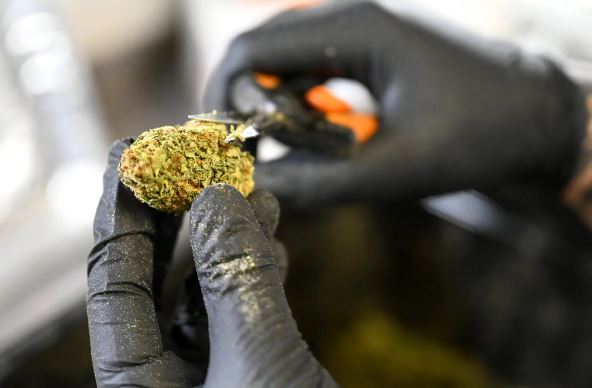In a notable shift, federal scientists have recommended the removal of marijuana from the most restrictive category of drugs, citing its lower risk and potential medical benefits compared to other controlled substances. The 250-page scientific review, disclosed through a lawsuit, reveals the perspectives of federal health officials who are contemplating a significant reconsideration of marijuana’s federal status.
Since 1970, marijuana has been designated as a Schedule I drug, along with heroin, indicating no medical use and a high potential for abuse. The review suggests reclassifying marijuana as a Schedule III drug, aligning it with substances like ketamine and testosterone, available by prescription. This recommendation has set off debates within the Drug Enforcement Administration (DEA), with tensions emerging between conservative agency officials and those advocating for reclassification.
The review, conducted by scientists at the Food and Drug Administration (FDA) and the National Institute on Drug Abuse, challenges the longstanding classification of marijuana. It acknowledges that while marijuana is the most frequently abused illicit drug, its impact is less severe compared to Schedule I or II drugs. The analysis notes physical and psychological dependence but concludes that the likelihood of serious outcomes is low. Moreover, the review highlights “scientific support” for therapeutic uses of marijuana, such as treating anorexia, pain, and chemotherapy-related nausea and vomiting.
These findings prompted the FDA to break from decades of precedent last August, recommending to the DEA that marijuana be reclassified. The DEA is currently reviewing this recommendation, and a formal decision is expected in the coming months. The potential rescheduling of marijuana is seen as a significant development by advocates, who believe it could bring marijuana businesses into mainstream legality, subject to the same tax regulations as other major corporations in the United States.
However, some experts remain cautious, pointing out that long-running studies reviewed by federal authorities may not fully capture the escalating potency and increased use of marijuana in recent years. There are concerns about its association with psychiatric problems and chronic vomiting. While marijuana was once considered a potential tool against opioid abuse or mental health issues, evolving research has debunked many therapeutic claims. The decision to reconsider marijuana’s classification as a medicine is questioned by critics, particularly as evidence of potential harm has grown stronger.
President Biden, acknowledging issues of racial disparity in marijuana-related arrests, urged federal officials in October 2022 to re-examine marijuana classification. This call was accompanied by pardons for individuals charged with marijuana possession under federal law. The move was in response to the disproportionate rates of arrest and prosecution of Black and Hispanic individuals for marijuana-related crimes. Despite the popularity of marijuana, with an estimated 52 million people in the United States reporting its use in 2021, its federal classification has remained a subject of intense debate.
Currently, 38 states have legalized marijuana for medical use, and two dozen states and territories allow recreational use. Advocates argue that decriminalization and legalization are gaining widespread support and have led to positive outcomes in states like Colorado, where marijuana is regulated similar to alcohol. However, the federal government’s reconsideration of marijuana’s status highlights the complexity of the issue, with potential implications for its legal, medical, and economic aspects.
The DEA’s final decision on marijuana’s reclassification will follow a period of public comment and debate. The ongoing tensions between conservative elements within the DEA and those advocating for a shift in marijuana’s federal status underscore the broader challenges in reshaping the narrative and regulations surrounding this widely used substance.

